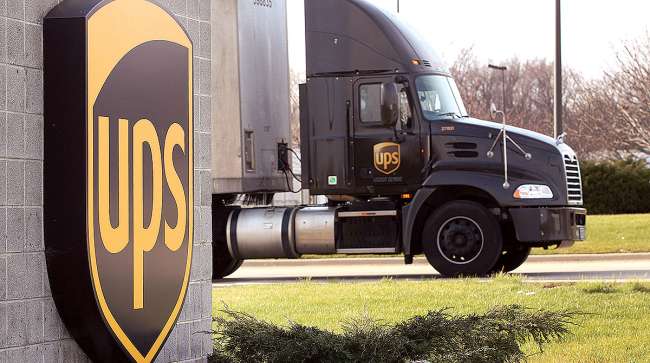Senior Reporter
Online Shopping Surge Delivers Record Revenue for UPS

[Stay on top of transportation news: Get TTNews in your inbox.]
UPS Inc. reported record fourth-quarter revenue as demand for package delivery soared amid the coronavirus pandemic, the company announced Feb. 2.
The Atlanta-based delivery giant said holiday package handling and the onset of COVID-19 vaccine distribution sparked a 10.6% rise in volume during the last three months of 2020, sending Q4 net income on an adjusted basis to $2.87 billion, or $2.66 a share, compared with $2.27 billion, $2.11, in the same period a year ago. The company reported record Q4 revenue of $24.9 billion compared with $20.5 billion a year ago.
Analysts polled by FactSet had been expecting earnings of $2.14 a share. Analysts had been expecting revenue of $22.9 billion.
However, one-time charges took a toll on the bottom line as the company on an as-reported basis posted a net loss of $3.26 billion, minus $3.75 a share, due to $5.6 billion in assessments — including a $4.9 billion mark-to-market pension charge — a $114 million after-tax impairment charge and a $545 million impairment charge related to its sale of UPS Freight to Canada’s TFI International.
UPS has an estimated $54 billion in long-term pension obligations on its books. It said it recognizes gains and losses on its pension assets on its income statement, as accounting standards require.
“I thank all UPSers for their extraordinary efforts to deliver industry-leading service through the holidays.” said Carol Tomé, CEO of UPS. “During the fourth quarter, we began transporting COVID-19 vaccines, and we stand ready to deliver hope and health to people around the world. “This is the highest quarterly operating profit in the company’s history, with record profit produced in each segment.”
UPS Q4 Financial Results by Transport Topics on Scribd
For 2020, UPS reported net income of $8.71 billion compared with $8.15 billion a year earlier as revenue rose 20.7% to $84.62 billion compared with $74.09 billion in 2019.
On Jan. 25, UPS announced the sale of its less-than-truckload UPS Freight division to TFI for $800 million, ending UPS’ 15 years in that sector. Tomé at the time described UPS Freight was “a capital-intensive, low-returning business,” and she the deal allows UPS to be, “even more laser-focused on the core parts of our business that drive the greatest value for our customers.”
As part of the sale, UPS Freight’s 14,500 full- and part-time employees will join TFI.
The companies also announced a five-year agreement under which UPS Freight to continue to utilize UPS’ domestic package network to fulfill shipments.
Besides the crush of holiday-related shipping, UPS and FedEx Corp. in December began shipping the COVID-19 vaccine from Pfizer and Moderna worldwide, bolstering UPS’ health care-delivery business. Tomé said that more than 45 days into the delivery process,UPS has provided “above 99% service” for the vaccine deliveries.

Tomé
“As we look past 2020 into the new year, we are optimistic,” Tomé said.
As has been the case for the past 11 months, UPS said the pandemic and state and local restrictions, including stay-at-home mandates, led to a boom in online deliveries.
UPS said Q4 revenue for domestic and international shipments rose by double digits.
Domestic package revenue in Q4 rose 17.4% to $15.7 billion compared with $13.4 billion in 2019. For the year, revenue in the division surged 15.1% to $53.5 billion compared with $46.5 billion in 2019.
International package revenue in Q4 jumped 26.8% to $4.77 billion compared with $3.76 billion, For the year, it increased 12.1% to $15.94 billion from $14.22 billion a year ago.
Fourth-quarter revenue from the supply chain and freight sector increased 29% to $4.38 billion compared with $3.39 billion a year ago. Over the full 12 months, revenue increased 13.5% to $15.18 billion compared with $13.38 billion from 2019.
UPS said it added more than 100,000 employees during Q4 to keep up with demand. While some of those hires were seasonal, the company said in October it expected a large percentage of workers to stay on to keep up with demand imposed by e-commerce and medical shipments.
UPS ranks No. 1 on the Transport Topics Top 100 list of the largest for-hire carriers in North America and No. 2 on the Transpoprt Topics Top 50 list of the largest logistics companies.
Want more news? Listen to today's daily briefing below or go here for more info:




